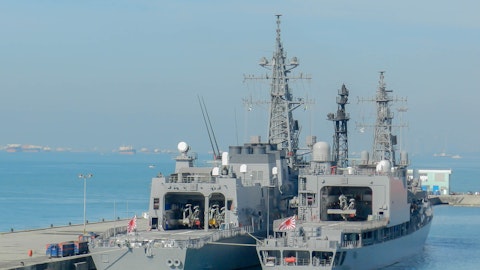Stuart Bradie: That’s a lot, Steve in one question. Yes, I mean, I think as we said, last quarter we were confident on the $925 million number and I think with what’s happened in HomeSafe we’re even more confident with the $925 million number and I’ll probably leave it at that until we get to May or whatever we have in our Investor Day. On the synergies, I thought I kind of explained earlier on, the bit that seems to be the connectivity piece between commercial and government is very much what’s happening in government international business and Frazer-Nash was a perfect example of that I explained earlier. We’re seeing a lot more connectivity in places like Saudi, we’re and in Australia for that matter where we’re very much seen the contracts there are far more commercial in the government realm and we’re seeing a lot more connectivity between the two businesses and our profile and being able to leverage our reputation from one into the other.
So I think, again, I’ll sort of limit my remarks to that, Steve, until we get to our Investor Day, but it’s certainly a hot topic. I understand there’s been a lot of discussion around the synergies between these businesses and truth what we should do with them strategically, but we’ll get to that when we get to Investor Day, if you don’t mind.
Operator: Our next question today comes from Sangita Jain from Keybanc Capital Market.
Sangita Jain: Yes, thank you for taking my questions. If I can ask a couple on HomeSafe, that’s $60 million of contract modification that was announced a week or so ago. How should we think about that? Is that all 2024 or does that split between ‘24 and ‘25?
Mark Sopp: Hey, Sangita. First thanks for visiting us a couple of weeks ago. Great to see you. It’s Mark here. The $60 million we can assume will be expended this calendar year. And so that is for recognition of the slower ramp and the overhead will incur along that path as well as the government and the client asking for more development, more capability out of the system, which we’re developing with our joint venture partners. And so it covers both of those rounds and we expect to burn through that this year and start moves in earnest pretty soon and hopefully picking up pace as the year progresses.
Sangita Jain: So is that part of that $150 million of HomeSafe revenue for this year then?
Mark Sopp: Yes, it is. It’s slightly —
Sangita Jain: Okay, and if I can ask one more on HomeSafe, how should we be factoring in backlog for that? How do you plan to do that and how should we think about it?
Stuart Bradie: Good question. There’s nothing in backlog today for HomeSafe in terms of moves and as we start to get clarity, we’ll book the backlog, that’s probably the way I would suggest. And when we get up to proper cadence, I think there will be an annual booking rather than trying to book 10 years in advance and we’ve just got to work through that but that’s our thoughts at the moment. So more to come on that but I think the takeaway today is that there’s nothing really in backlog of any material numbers for HomeSafe in 2024.
Operator: Our final question today comes from Gautam Khanna from TD Cowen.
Gautam Khanna: Hey, good morning, guys. I had a couple questions on HomeSafe. So the contract still seems subject to that service contract act and I was curious, has that been an issue with the folks that you’ve signed up, the 380 plus in terms of their ability to comply? I’m just curious like how much of a whatever burden that is on them that might slow the ramp for HomeSafe?
Stuart Bradie: I mean today, Gautam, the answer is no. I mean the whole point of SEA and TRANSCOM and KBR are committed to that and I had a conversation of a senior level in TRANSCOM a couple of weeks ago on the subject and I think firstly, neither, we really want providers who are behaving properly and doing proper screening and things as you can imagine for the military and doing what they should be doing from a remuneration perspective. But that, between TRANSCOM and ourselves, we’re pretty clear that will not disadvantage KBR commercially either. So I think there’s commitment to that. I know there’s been a lot of discussion around it, but at the moment, I think it’s something we’re working through, but I don’t see it as a concern. In fact, I see it as a huge positive in terms of the quality of the people that we’ll actually get to work for us and absolutely aligns with KBR’s values on people. So and actually with TRANSCOM’s intentions as well.
Gautam Khanna: Got you. And then we’ve obviously heard some pushback in the channel from like the pricing terms. I was curious if there’s any case for economic price adjustments. Have you guys had any indication from the customer as to whether they’re looking at that again or?
Stuart Bradie: Yes, I mean, it’s an ongoing annual review process. I think we explained that earlier. There are those economic price adjustments with built into the contract to review as we go forward. And that includes pass through increases in things like fuel. And so it’s in that sense, I’m pretty confident we’ll get this. I mean we’ve got most of it, whether we’ve got the supply chain signed up on the terms that we need them to be signed up on already. Obviously, they’ve been making hay while the sun shines a little bit during COVID. And I think there’s been quite a lot of increases and you can understand the noise. But ultimately, the objective of this is actually to do a better job in terms of quality for and make the move experience better for the military families at the moment, the feedback is not positive in that.
And then secondly is actually to somewhat disrupt the industry so it becomes far more competitive and a lot of the middle layers are taken out and we get a focus into the actual truckers and their families and we actually help them grow their businesses because they’re performing and they’re accountable. So I expect more noise in that sense and I’m concerned about the rate structure. No, I’m not, I think we’ll work through that with TRANSCOM and the supply chain in collaboration. And to date we have not seen other than from some making noise in the media too much trouble in that regard.
Operator: That concludes the Q&A portion on today’s call. I will now hand back over to Stuart Bradie for any final remarks.
Stuart Bradie: Okay, thank you very much. Good questions and thank you for your time. As always and your interest in KBR. I think in short, we’re well on our path to our $925 million target in EBITDA terms double digit growth with margin expansion going into the year albeit as well, Mark, and the team have done a great job preserving the balance sheet to give this capital deployment optionality and with 75% work under contract feeling really good about the year ahead. So all up very buoyant and obviously the HomeSafe stabilization and a bit more clarity there also really, really helps. So thank you very much indeed. We’ll be doing the STS Primer obviously in a couple of weeks’ time which will lead us into Investor Day in due course. So thank you.
Operator: That concludes today’s Q4 and FY2023 KBR Inc. Earnings Conference Call. You may now disconnect your line.
Follow Kbr Inc. (NYSE:KBR)
Follow Kbr Inc. (NYSE:KBR)
Receive real-time insider trading and news alerts



